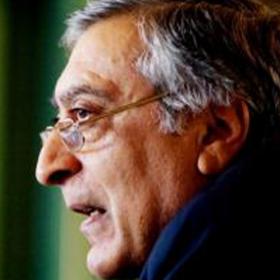
Limits to a U.S.-India Strategic Dialogue
Writing for the Mail Today, Kanwal Sibal argues that the scope of a strategic dialogue between the U.S. and India is limited by U.S. relations with India's main adversaries, China and Pakistan.
Sibal, a former foreign secretary of India and a member of EWI's Board of Directors, suggests that U.S. and Indian interests are not aligned closely enough to elevate the two countries' relationship to the level of a "strategic dialogue.
"At what stage is normal diplomatic parleying ready for being upgraded to the level of a strategic dialogue?" he asks. "Clearly, the basis has to be sufficient bilateral understanding on key issues that materially affect the fundamental interests of the countries involved, enough to be able to work together to align interests as much as possible and formulate and adjust policies accordingly."
Sibal suggests that such an alignment of interests does not exist in the U.S.-India relationship. "In reality, it is not possible for the U.S. to reconcile the contradictions inherent in any serious 'strategic' discussions with India as well as countries that India sees as most antagonistic to it in strategic terms -- China and Pakistan," he writes.
Specifically, he argues that the U.S. will be reluctant to compromise its sensitive relationship with China, and India would prefer to resolve its issues with China without U.S. intervention. " In the case of India’s relationship with China, serious strategic issues are at play, whether those relating to the unsettled border, China’s strident claims on Arunachal Pradesh, the militarization of Tibet, China’s relationship with Pakistan etc.," he writes. "These contentious issues will remain outside the scope of the India-U.S. strategic dialogue. The U.S. would not like to wade into them and India too would be averse to bringing in any third party into its bilateral territorial problems with China."
Similarly, he suggests that U.S. ambitions in Afghanistan and Pakistan also complicate the India-U.S. dialogue. "Pakistan will continue to receive military aid both as an incentive to cooperate more with the U.S. in counterinsurgency operations against the Taliban and as an assurance of a longer term engagement with the country that would endure beyond the resolution of the Afghanistan problem, of which enhanced economic aid and the strategic dialogue at Foreign Minister’s level are an integral part," he adds. "Notwithstanding what is being said about not allowing any country to have any dominating role in Afghanistan, the fact remains that a political solution in Afghanistan that provides for Taliban’s participation would give Pakistan the role it seeks. An upgraded India-U.S. strategic dialogue is not going to alter these realities."
"Notwithstanding the rhetoric and atmospherics and India’s interest to explore the full potential of improved bilateral ties in our own national interest, the upgraded strategic dialogue with the U.S. should not beguile us into believing that a strategic understanding with it has been reached," he concludes, adding: "Were the U.S., which has overlooked China’s proliferation activities in Pakistan in the past, to condone them again, the limits of an India-U.S. strategic understanding would have been clearly drawn.

